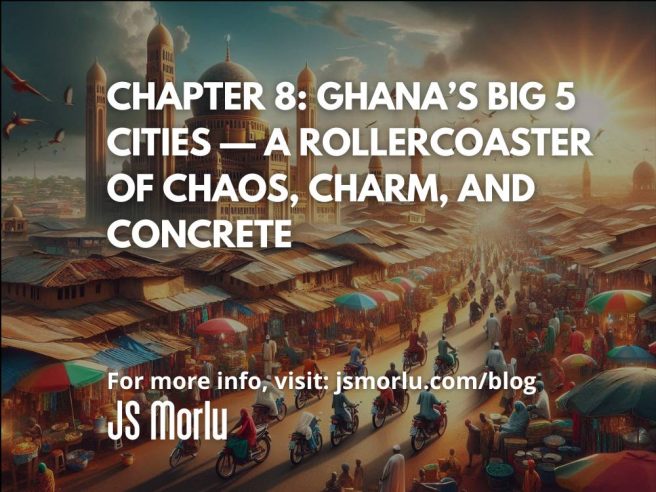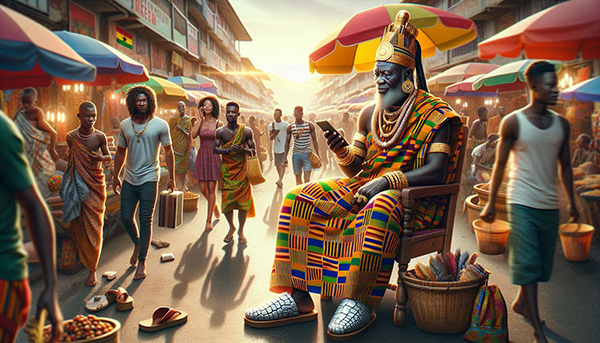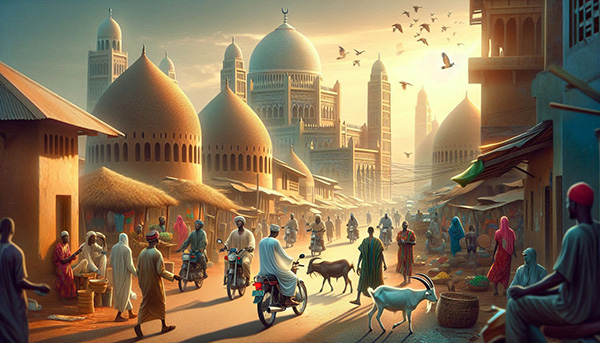By: John S. Morlu II, CPA
Let’s take a road trip through Ghana’s top five cities — where GPS loses signal, but your sense of humor must stay strong.
1. Accra — The Capital of Contradictions
Accra is like that rich uncle who lives in a mansion… but refuses to fix the leaking roof.
It’s Ghana’s glitzy capital — the crown jewel of the country. You’ll find embassies from almost every country, fancy rooftop bars that serve cappuccinos with foam art, and Instagrammable brunch spots with names like “The Garden,” “Urban Taste,” or “Oasis Vibes.” But don’t let the aesthetics fool you — right outside, you’ll also see someone selling boiled eggs on their head, and a trotro driver yelling “Madina! Madina!” like it’s a national anthem.
Accra is where skyscrapers battle with open gutters. Where Teslas and tro-tros share the same roads, both dodging potholes large enough to host Olympic diving events. And let’s not forget the traffic — it’s like a car fashion show where everyone arrives late and nobody knows who’s in charge.
Traffic Fact: You could literally read a book, watch a telenovela, AND eat a whole pack of groundnuts — all while stuck at a single roundabout. True story.
Here, real estate prices compete with London, but the drainage system competes with Minecraft. When it rains, it doesn’t just pour — it floods like Noah forgot to close the Ark. Some roads become rivers, and Uber drivers magically turn into canoe captains.
Fun Fact: A two-bedroom in East Legon can cost more than a luxury condo in Virginia. And no, that price does NOT include paved roads or consistent water flow.
Meanwhile, goats still cross the road like they paid property tax — strutting with the confidence of real estate agents. In fact, it’s the only place in the world where livestock and Lamborghinis can be spotted side by side.
And yet — somehow — Accra works. People smile. Music plays. Waakye flows like currency. You can go from a boardroom in Airport City to a party in Osu, to a prayer vigil at midnight — all in one day. You may not understand how, but Accra always finds a way to function.
Bonus Fact: Despite the chaos, Accra’s beaches are stunning. There’s something magical about watching the sunset with a kebab in hand, dodging footballs from kids who believe they’re the next Mohammed Kudus.
Nightlife? Unmatched. Whether it’s an afrobeats rooftop session, a spoken-word café, or a late-night street jollof mission — Accra never sleeps.
2. Kumasi — Where Tradition Wears Sneakers
Welcome to Kumasi, the cultural capital of Ghana and the heartbeat of the mighty Ashanti Kingdom — where tradition isn’t just preserved… it’s proudly flexed like a gold ring on a chief’s finger.
Kumasi is like your grandpa who owns an antique walking stick carved from sacred wood, but also knows how to use Snapchat and sends you Bible verses on WhatsApp — with emojis.
This is the land of Asantehene (Ashanti King), Kente cloth, and royal palaces. You can literally bump into a chief wearing sandals made of crocodile leather while holding a smartphone with 3 WhatsApp groups open. Kumasi is where history and hashtags collide.
Kejetia Market is the beating, chaotic heart of it all. It’s not a market — it’s an entire planet. A galaxy of yam sellers, secondhand clothes, tire repair guys, and people who can fix your phone with just a paperclip and prayer. It has 11 entrances, 2 exits, and zero logic. If Google Maps tries to help you there, it just gives up and says, “Good luck, fam.”
Traffic? Oh, it’s intense. So intense you could start reading the Bible in Genesis and by the time you move 3 blocks, you’re already in Exodus. But nobody’s in a rush — because Kumasi teaches patience. Or forces it. Same thing.
Fun Fact: In Kumasi, respect is not optional — it’s a survival skill. Try saying just “Hi” without “Good morning, sir” or “Good afternoon, madam” and the response will humble you faster than a surprise test.
Even kids in Kumasi greet you properly, bowing like little diplomats. It’s not just about manners — it’s how you show you were raised properly. One uncle once paused mid-fufu bite to scold a teenager who forgot to say “please.”
But don’t get it twisted — Kumasi isn’t stuck in the past. People here are TikTok-famous, run e-commerce businesses out of kiosks, and throw weddings that look like Netflix documentaries. You’ll find DJs spinning afrobeats right next to drummers playing traditional Fontomfrom.
You want authentic Kente? This is where it’s born. Not the cheap “Made in China” knock-offs. Here, Kente is woven by masters who treat every thread like a national treasure.
Bonus tidbit: Tro-tros in Kumasi have personality. Some blast gospel so loud it could convert atheists. Others play old highlife music so sweet, you forget you’re sweating in traffic.
3. Takoradi — Oil, Beaches, and Jollof
Ah, Takoradi — also known as Taadi to the cool kids and Oil City to the government officials still waiting for that oil money to “trickle down.”
This place is where construction cranes and coconut trees live in peaceful confusion. It’s half tropical vacation, half half-finished mall. The beach waves crash like a Drake beat, but the road to get there might crash your suspension.
If you’re into fried fish, sunsets, and sand in your shoes, Takoradi is your dream. The beaches stretch long and wide, the breeze smells like salt and grilled tilapia, and the people? Extremely chill. Like, almost too chill. You greet them with “Good morning” and they respond like you’re the one who’s late to their nap. Then — boom! — they invite you to eat, like you’ve been best friends since class 3.
But don’t be fooled. The city is still in its “under construction” phase — and might stay that way forever. It’s not uncommon to see a three-story building with one floor, no windows, and a hopeful signboard that says “Executive Apartments.” One contractor allegedly took mobilization money in 2018 and hasn’t been seen since. His picture now hangs on the wall next to the Prophet’s calendar.
Fun Fact: Takoradi has its own music genre — Taadi Rap — a blend of Fante, pidgin, and beats that slap harder than your grandma’s correctional slippers. These rappers mix fishing metaphors with oil economy complaints and somehow, it works.
And yes — there’s oil. Offshore rigs, big ships, and helmets. But if you’re thinking Dubai skyscrapers or Texas-style boomtowns, calm down. The money might be under the sea, but above ground, we’re still waiting. You’re more likely to see someone selling boiled eggs on the side of a fuel depot than driving a Range Rover from oil profits.
Taxis here are vibes-based. No meter, no problem. The driver sizes you up, you give your best “I’m not from here but I know what’s up” face, and the price magically drops from 30 cedis to 10.
Street corners feature drumming groups, football boys with Messi dreams, and palm wine spots where uncles argue over who built Ghana. They say “Takoradi boys don’t stress.” And it’s true. You could set off fireworks in a traffic jam and they’d just ask, “Is it a festival?”
Oh — and let’s talk jollof. Takoradi jollof is spicy, sassy, and unapologetically smoky. Some even claim it’s better than Accra’s — but don’t start that war unless you’ve got time and fire insurance.
4. Tamale – The Heat, the Culture, the Motorbikes
Welcome to Tamale — where the sun doesn’t play, the motorbikes outnumber humans, and goats casually attend town meetings.
Located in Ghana’s Northern Region, Tamale is the cultural capital of the north. It’s where tradition wears sunglasses, and every second person has a motorbike (locally called a “motorking” if it looks like it was assembled by Transformers).
Fun Fact #1: Tamale holds the Guinness World Record for “City Most Likely to Cook You Alive by 2PM.” Okay, not really — but it feels that way. Sunscreen doesn’t work here. Even your Wi-Fi gets hot.
Fun Fact #2: There are more motorbikes than mosquitoes, and that’s saying something in Ghana. People ride them in suits, with babies, goats, and sometimes all three at once. And don’t ask about helmets — helmets are like unicorns: magical, rare, and mostly found in textbooks.
Culture Alert: Tamale is deeply traditional and predominantly Muslim, which means Friday is for mosque, not meetings. If you’re new in town and try to schedule a business deal at 1pm on a Friday, someone will kindly explain: “Boss, Allah first.” And they’re right.
The architecture here is different too — round huts, beautiful mud-and-stick designs, and grand mosques that shine like mini Taj Mahals under the blazing sun. Even the taxi signs quote the Qur’an. It’s deeply spiritual, beautifully calm, and rich in tradition.
Food? Groundnut soup, Tuo Zaafi (TZ), and guinea fowl so good, even chickens file complaints. Be warned: If you’re not used to TZ, it will stare at you like “You sure you can handle me?” It’s not just food — it’s a full-contact sport.
And let’s talk development. Tamale is growing fast. There are more NGOs than banks, and if you throw a stone, you’ll hit either a charity worker, a youth activist, or someone building a borehole. But traffic? Forget it. Tamale traffic is just two donkeys, one tricycle, and a guy waving at you for no reason.
Fun Fact #3: Tamale is also the arts and crafts capital. Walk around town and you’ll see beautiful leather sandals, colorful smocks, and more beaded necklaces than Beyoncé’s tour outfits.
Electricity can be dramatic — it comes, it goes, it teases. Locals call it “power flirting.” And when the lights go out, the entire neighborhood just shrugs and continues life like, “Eii, this one too shall pass.”
And don’t get it twisted — people here are sharp. Kids as young as 10 can repair a bike engine, negotiate a trade deal in Dagbani, and still beat you at FIFA. Respect.
5. Cape Coast – History, Waves, and School Spirit
Cape Coast is like your super smart cousin who used to cry in class but now has a PhD and 1 million followers on TikTok. It’s historic, emotional, and surprisingly fun — all at the same time.
First things first: The Castle.
Cape Coast Castle is one of the oldest European buildings in sub-Saharan Africa. It’s where slaves were held before the Middle Passage. Going through the “Door of No Return” is not just a tour — it’s a deep, soul-stirring, silent-for-20-minutes-after experience.
But don’t cry too long — right next door is a city obsessed with education.
Wesley Girls. Mfantsipim. Adisadel. St. Augustine’s.
The schools here are so competitive, their alumni argue about Jollof and who invented lightbulbs. And don’t even mention sports unless you want a 3-hour debate with PowerPoint slides and referee receipts from 1994.
Fun Fact #1: Cape Coast used to be Ghana’s capital until 1877. That’s right — before Accra got the Wi-Fi and skyscrapers, Cape Coast had governors, gold, and grammar schools.
Fun Fact #2: It has some of the best beaches in Ghana. But don’t expect five-star resorts. No. You get coconut trees, volleyball nets, grilled tilapia, and someone selling beads while doing the moonwalk.
The fishing culture here? Legendary. Fishermen go to sea like warriors. And when they return? The entire beach becomes Ghana’s version of Wall Street — fish flying, deals flying, and someone yelling “Obroni! Come buy snapper!” like you came all the way from New York for one fish.
Culture alert: Every street corner has a chop bar (local restaurant), a palm wine joint, and a group of teenagers practicing Azonto or TikTok dances with Olympic energy.
Education city vibes: Cape Coast is where backpack meets beach. You’ll see students writing exams in the morning and surfing in the evening. If Harvard had waves and pepper soup, it might feel like this.
Warning: Fante food is good — dangerously good. Fante kenkey, eto, abɛ, and all the fish dishes your doctor warned you about. Eat too much and you’ll blame the ocean breeze for your new belly.
And one last thing: People from Cape Coast are hilarious — they’ll tease you, feed you, lecture you, and call you family in one afternoon. You’ll leave with a full heart and a full stomach.
Final Word
Each city has its drama, charm, and unique definition of “organization.”
But somehow, it all works. Like a jollof recipe with mystery ingredients.
Ghana’s top five cities:
Come for the history.
Stay for the potholes.
And leave with stories your grandkids will never believe.
📖 Coming Up Next: Chapter 9 – Tech, Titles, and Traffic in Ghana’s Startup Scene
Author: John S. Morlu II, CPA is the CEO and Chief Strategist of JS Morlu, leads a globally recognized public accounting and management consultancy firm. Under his visionary leadership, JS Morlu has become a pioneer in developing cutting-edge technologies across B2B, B2C, P2P, and B2G verticals. The firm’s groundbreaking innovations include AI-powered reconciliation software (ReckSoft.com) and advanced cloud accounting solutions (FinovatePro.com), setting new industry standards for efficiency, accuracy, and technological excellence.
JS Morlu LLC is a top-tier accounting firm based in Woodbridge, Virginia, with a team of highly experienced and qualified CPAs and business advisors. We are dedicated to providing comprehensive accounting, tax, and business advisory services to clients throughout the Washington, D.C. Metro Area and the surrounding regions. With over a decade of experience, we have cultivated a deep understanding of our clients’ needs and aspirations. We recognize that our clients seek more than just value-added accounting services; they seek a trusted partner who can guide them towards achieving their business goals and personal financial well-being.
Talk to us || What our clients says about us



